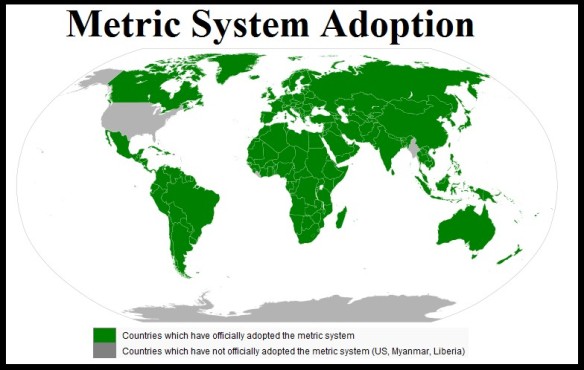The first day I arrived in the US my landlord picked me up with her car at the light rail station. She was obviously surprised by my body height, so one of her first questions was: “How tall are you?” I proudly responded “1,93 meter” and looked into a clueless face. The next question was:”How many foot/inches?” That was the day I installed a nice, little app called “Unit Converter” on my phone, which is really helpful in such situations. But when I opened the app the first time I became aware in how many fields, the measurements differ.
E.g. I picked the most famous examples to demonstrate the differences.
Fuel consumption is measured in mpg instead of l/100km
Length and Distance
Area
Mass and Weight in lbs instead of kilos
Speed in mp/h instead of km/h
Temperature: Fahrenheit instead of Celsius
Cooking: Teaspoons, Cups and Ounces versus Milligram and Liter
Apps make it easy to convert the units, but sometimes it is still inconvenient to stop a conversation or negotiation and convert measures. I always asked myself why it is so hard to find a common unit and why the US don’t do any efforts to adapt theirs. In a globalized world American companies constantly interact with other companies, which are using the metric system. That is, why I am curious if there were some efforts in the past to change the system of measurement.
 Source: https://www.scienceabc.com/wp-content/uploads/2016/07/yNAsr.jpg
Source: https://www.scienceabc.com/wp-content/uploads/2016/07/yNAsr.jpg
“In 1968, Congress authorized the U.S. Metric Study, a three-year study of systems of measurement in the United States, with emphasis on the feasibility of metrication. The final report of the study concluded that the U.S. would eventually join the rest of the world in the use of the metric system of measurement. The U.S. Metric Study recommended that the United States implement a carefully planned transition to the principal use of the metric system over a decade. Congress passed the Metric Conversion Act of 1975 “to coordinate and plan the increasing use of the metric system in the United States”. Also the United States Metric Board (USMB) was established for planning, coordination, and public education. In 1981, the USMB reported to Congress that it lacked the clear Congressional mandate necessary to bring about national conversion. Because of this ineffectiveness and a reduction of federal spending the USMB was disbanded in the autumn of 1982.”
(read more about this at: https://en.wikipedia.org/wiki/Metrication)
When it comes to measuring carbon emissions, I hope politicians will find a common and global agreement. It would improve safety, understanding, trade, negotiations, science and so many fields more. At least it will support a global approach to fight the carbon emissions and the global warming as a result. Let the loss of a Mars Climate Orbiter in 1998 be the worst consequence of different measuring systems between the US and the rest of the world.
[1] https://en.wikipedia.org/wiki/Metrication_in_the_United_States
